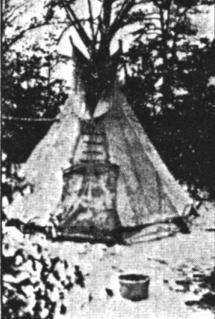Adventure in Earth Sports
Bruce LadebuIn the last 10 years, the trend to get back to
nature has increased. The art of backpacking has become very popular. The few
places in our area for wilderness travel have become somewhat crowded.
I have backpacked through many wilderness areas
throughout the United States and have encountered a wide assortment of
backpackers. I have come to the conclusion that there are several types of
wilderness travelers.
The first type of backpacker is the one who is
not sure why he is out in the first place. One time in the Minister Creek area
of the Allegheny National Forest, I was camped by a stream when four tired
packers came tromping into the area..
Looking somewhat like a picture on a T-shirt I
once saw, they had pots and pans, radios and other assorted goodies hanging
everywhere from their packs. They greeted me and dropped their packs as though a
ton of weight had been lifted from their shoulders. Much to my dismay, they
started pitching their tents at my feet. I politely and diplomatically pointed
out a beautiful and scenic spot down the creek. They moved.
After several hours they managed to make camp.
They got settled in and sat down, staring at each other. About 20 minutes went
by when one finally said, "Well, what do we do now?" After some
deliberation, they finally decided to hike out the three miles to the road and
head for the nearest pub.
They cheerfully took off down the trail. I
slept a quiet night. The next morning as I was packing up, the four mountain men
came down the trail. They related that they were a bit under the weather and
ended up sleeping in their van. I took off down the road while they proclaimed
what a wonderful place the wilderness was.
The second type of backpacker hikes 50 miles a
day, carries a 100 pound pack and looks like a gorilla.
Once on the Pacific Coast Trail in Washington
State, I had a close encounter with one of these marathon packers. It had been a
beautiful day and I hiked about 15 miles. I had taken the time to photograph the
abundance of wildlife I had seen along the way.
Sitting there contemplating the beautiful
mountains, I felt the ground start to shake. Looking up the trail, I saw him -
Bigfoot with a backpack on.
Hiking about 30 miles an hour, he cruised up
and stopped abruptly where I was sitting. "Howdy," he growled. I
nodded and asked if he had ever seen the elk back in the meadow. Without
blinking an eye, he started down the trail mumbling that he didn't know about
them their elk, but he bet he could make another 10 miles before dark.
 |
The third type of backpacker is the wilderness
nut. The squirrels love him. I encountered this type out west far more than
here. This traveler is never alone. Always leads a small group of novice
backpackers. The leader always stomps through your camp, proclaiming to have had
visions, and is leading his people to the promised land.
Several years ago in the back country of
Yellowstone, a group like this spent two hours in my campsite telling me what I
was doing wrong and lecturing me on wilderness travel. We patiently tried to
communicate with these backpackers that we loved the wilderness and spent lots
of time traveling through it. Might as well have talked to a fish. The group
fled down the trail obviously upset that we did not jump up and follow.
We spent the next several days enjoying the
solitude and photographing wildlife. When we arrived back at the ranger's
station, we found that the friendly group we encountered was overdue and lost in
the wilderness. As it turned out, the group tried to cut cross country to
another trail and lost their way. They were finally rescued, and their somewhat
indignant leader kept claiming he knew where they were all the time. |
The last type of backpacker is the true lover
of wilderness. He travels with only the essentials, enjoying the outdoors for
what it is. He travels through it, trying not to change it or disturb it.
My next column will be about this type. In the
words of Edward Abbey, "Keep America Beautiful; grow a beard; take a bath;
burn a billboard".
Previous
Contents Next
|

